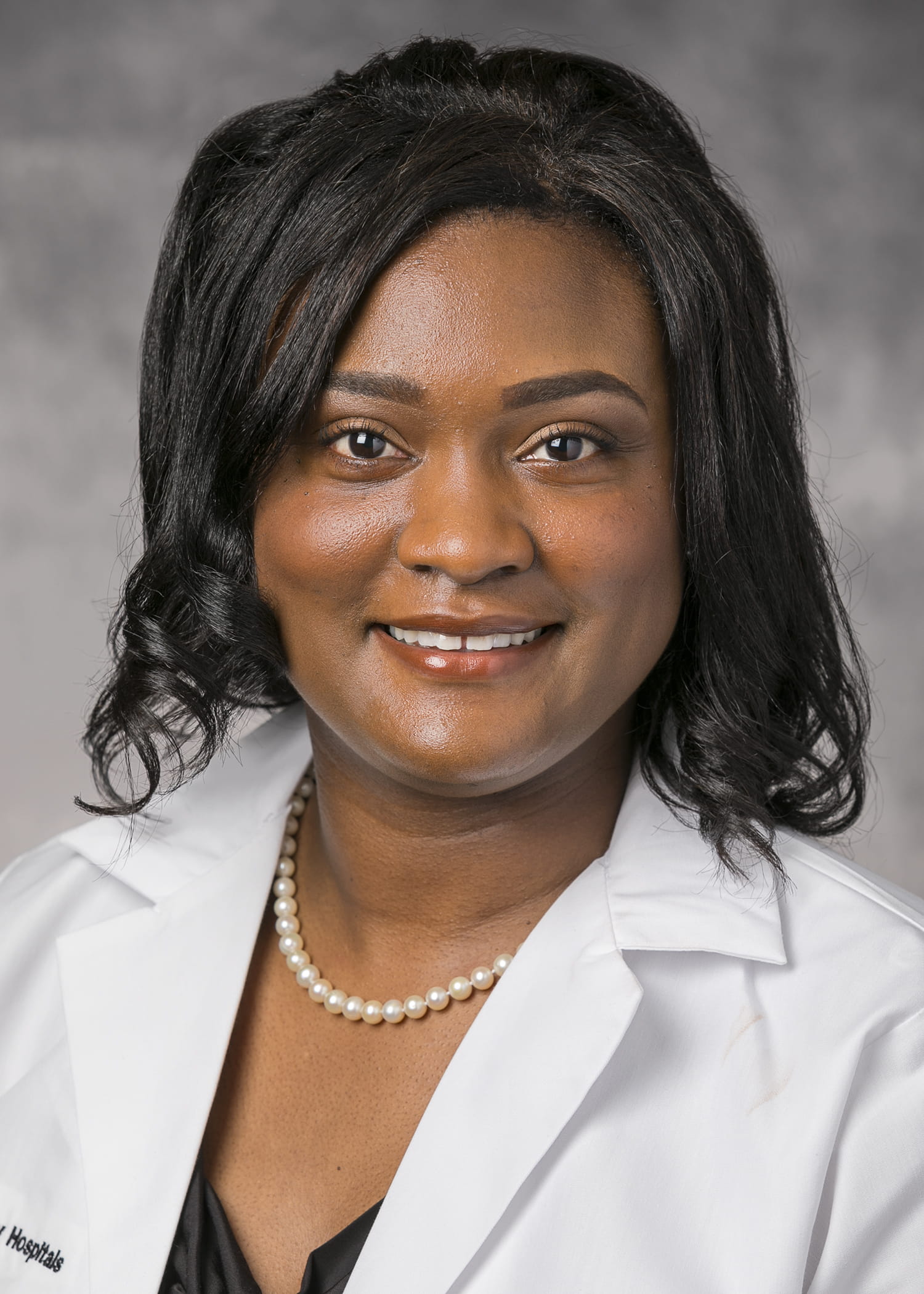Physician Highlight: Tiffany Hodges, MD
May 25, 2021
Mentoring the next generation
Innovations in Neurosurgery & Neurological Surgery | Summer 2021
Tiffany Hodges, MD, will never forget the physician-mentors who helped her shape her medical career.

It’s a primary reason she joined a health system with a focus on medical and resident education.
“It was very important for me to have an academic job,” says Dr. Hodges, a neurosurgeon at University Hospitals Neurological Institute and Assistant Professor of Neurosurgery at Case Western Reserve University School of Medicine. “I’m very thankful and appreciative of my mentors who have helped me get to where I am today, so I want to pay it forward.”
One of her earliest mentors was a neurosurgeon who trained in neuro-oncology, she says. “He took me under his wing and taught me so much.”
With her mentor’s support, Dr. Hodges completed her residency at Duke University School of Medicine and went on to pursue a fellowship in brain tumor and brain surgery care at The University of Texas MD Anderson Cancer Center, before joining University Hospitals in 2017.
Meeting the team at UH convinced Dr. Hodges that it was a place she could continue to grow and pursue her interests.
“As someone who isn’t from Cleveland, you have to learn the culture and geography,” says the Georgia native. “But everyone here has been extremely supportive. I came in as an outsider with all of these new ideas, and people are very open and welcoming to different ways of doing things. What I really love about UH is that it’s always moving forward.”
Advancing Care for Brain Tumors
Dr. Hodges always knew she wanted to become a doctor, but her interest in neurosurgery materialized in medical school.
“I thought I would focus on treating diseases like Parkinson’s and Alzheimer’s,” she recalls. “Then I fell in love with neurosurgery during surgical rotations.”
As an oncologic neurosurgeon at University Hospitals Neurological Institute, Dr. Hodges works with a diverse team of clinicians and specialists to treat patients in need of brain tumor surgery, management and care. “It was the faculty and staff that attracted me here — and being able to do the types of surgeries I like to do,” she says.
Robin Buerki, MD, shares clinic with Dr. Hodges on Friday mornings at University Hospitals Seidman Cancer Center. “We’re able to offer a multidisciplinary approach to patients, which improves that level and quality of care for patients,” says Dr. Buerki, a neuro-oncologist at UH Cleveland Medical Center since 2019.
Dr. Hodges sees patients at University Hospitals Cleveland Medical Center and at University Hospitals Ahuja Medical Center, operating on patients 2-3 times per week. She works in clinic twice per week.
Her patients benefit from her training in complex and highly technical surgical techniques for brain tumor treatment, including craniotomy for tumor resection, language and motor mapping resection, laser ablation procedures and other advanced surgical options.
“Having that expertise is a huge advantage to patients in the community,” Dr. Buerki says. “Dr. Hodges is a great clinician and surgeon, and I always tell patients that even if you like her personality, the real proof is in the pudding.”
Asking Important Questions
In addition to her practice, Dr. Hodges’ role at UH gives her time to pursue important clinical research. She has contributed to multiple studies exploring the gender, socioeconomic and racial disparities in patients with brain tumors. Her research extends beyond surgical outcomes to also look at differences in overall patient outcomes, such as morbidity and mortality.
“Surgery is just one part of patient care,” she explains. “There is also clinical trial evaluation, systemic treatment, radiation treatment and other care; so it’s very multi-modal.”
One study looked at two types of high-grade brain cancers — glioblastoma and gliosarcoma — to examine the impact of a patient’s race on care by analyzing the National Cancer Center Database. Two more similar studies examined the association of race and ethnicity with survival rates for patients with gliosarcoma and intracranial meningioma. Research teams, which included residents and medical students from the School of Medicine, reviewed factors such as the patients’ time to treatment, access to care and even access to insurance.
“We need to keep these things in mind when it comes to clinical trial design, to make sure patients are getting standard of care or better for brain cancer,” Dr. Hodges says. “It’s critical to look at all factors that affect their overall survival, like access to insurance, where they live geographically and how often they are able to make it to their appointments. These are big, important questions that we haven’t really evaluated before.”
For patients with glioblastoma, for example, simply having access to any clinical trial impacts the patient’s outcome, she says. “Just being in the clinical trial — it doesn’t matter what kind — makes a difference, which is amazing.”
Dr. Hodges and her colleagues recently received approval for a new study to examine the differences in brain metastases from gynecological cancers, such as uterine and ovarian cancers. “Gynecological malignancies that metastasize to the brain are rare, so there’s not a lot of data,” she says. “We’re collecting data on patients at UH, looking at the pathology, how they were treated, what type of treatment regimen they were on and their outcomes.”
Clinical research is another opportunity to teach and mentor students, which Dr. Hodges continues to highlight.
“Not only do you have a chance to help patients, but you have an opportunity to move the field forward by teaching the next generation of neurosurgeons,” she says. “Our involvement in education allows for innovation in neurosurgery and the possibility to make the field better than it is.”


